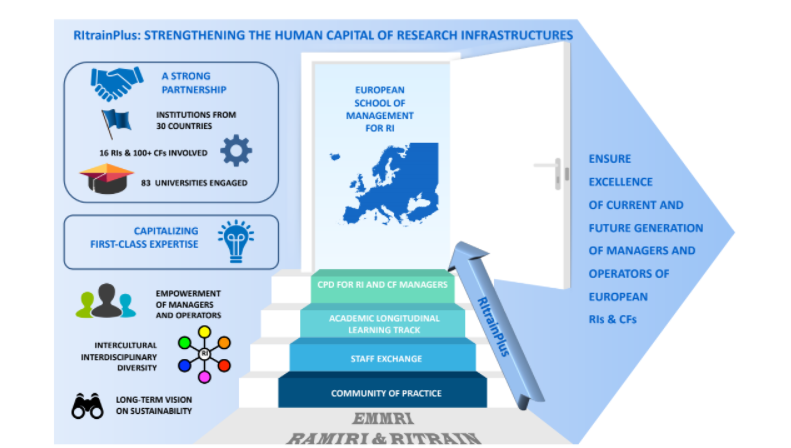
Research infrastructures and advanced scientific facilities are complex organisations. Not only do they operate at the leading edge of scientific and technological feasibility, but they also need to work with a large number of different stakeholders and funding mechanisms. Managers of research infrastructures must have a scientific understanding, be part of the scientific user community, and at the same time balance the scientific needs and the technical possibilities with the management skills necessary for the operation of large, expensive facilities and the diplomatic skills required to engage with and define agreements between a large number of international actors. The critical role of identifying, training and retaining the high-level staff necessary for the successful operation and long-term sustainability of research infrastructures has been identified by many stakeholders as a priority and documented in many policy documents.
This Project brings together, for the first time, research infrastructures, core facilities, business management Schools and European universities, in a new innovative concept to transform the access and empowerment of human resources for national and international scientific facilities in Europe. The RItrainPlus project will transform the skills-base to drive the professionalisation, efficiency and long-term value creation of European Research Infrastructures and Core Facilities.
To achieve these overall goals RItrainPlus will implement the following specific objectives:
● competency profile definition and identification of training needs;
● design and delivery of specific cross-field executive programmes at the post-doctoral level (Continuous Professional Development courses), as formal learning activities targeting current medium and senior managers of RIs and CFs;
● development of a “Train the trainers’ kit”, to allow other providers to replicate the courses and to ensure the scalability of Continuous Professional Development courses;
● development of a coaching programme for managers working in RIs, to reinforce the knowledge transfer methodology with a more personalized and tailored training;
● development of staff and knowledge exchange with a short-term mobility programme at different RI/CF locations, to promote the learning on the job approach;
● development of a community of practice to structure opportunities of knowledge and best practices sharing, through a peer learning approach;
● development of Learning Activities to be embedded in existing university programmes at different EQF levels to form an innovative, flexible and certifiable European Longitudinal Learning Track for the qualification of future operators and managers of RIs and CFs from different fields;
● development of the concept for the establishment and operation of the European School of Management for RIs with a significant impact on the sustainability of training in the entire RI ecosystem;
● implementation of an efficient communication and dissemination strategy to maximize RItrainPlus impact and foster the largest adoption of the RItrainPlus outcomes in the European universities landscape;
● connect to the ERIC Forum and to the European Open Science Cloud (EOSC) to support cooperation on professionalizing of RIs staff for improved service functions.
